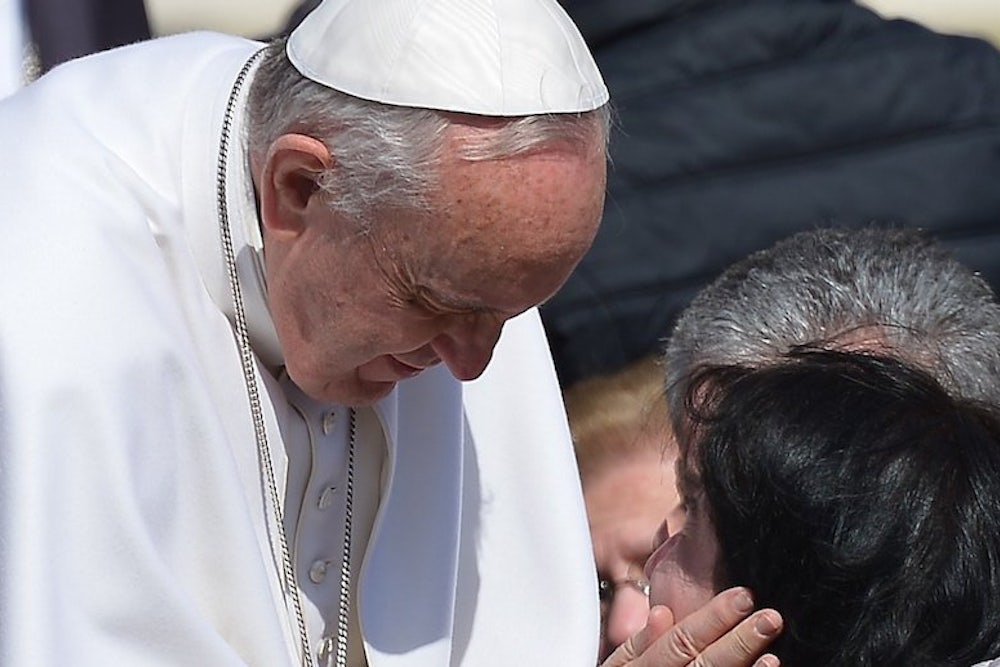If Pope Francis single-handedly ended global poverty tomorrow through some sudden miracle, there would still be liberal malcontents prepared to attack him for maintaining traditionally Catholic views on some of the pet issues of the Anglophone center-left. Complaints about Pope Francis’s old-fashioned backwardness are especially tied up in his failure to qualify as a good center-left feminist. There is still a healthy contingent of liberal writers who call with depressing regularity for Pope Francis to think more like an American Democrat, without acknowledging the nature of Pope Francis’s special relationship with the 1.2 billion Catholics worldwide. If he were to abandon Catholic teaching on birth control and the ordination of women priests, his ability to influence Catholic thought on matters of capitalism and climate change would be reduced to nil.
Odd criticisms of the Pope's supposedly anemic feminism have been something of a hallmark of his papacy. In July of 2013, mere months after Francis became pope, The Guardian published an essay entitled “Thanks for nothing, Pope Francis”: the “nothing” in the title being his failure to instantaneously transform Catholic doctrine to make women priests. Shortly thereafter, in August of 2013, the Los Angeles Times ran a similar article concerned with “Pope Francis’ woman problem.” “Full recognition of women's religious calling and authority would be a start in dismantling theological justifications that enable sexism, misogyny and exploitation,” the essay argued, cleanly devoid of a theological argument for its envisioned reform. Following these predecessors, The American Prospect published an article Wednesday arguing much the same: “Were the pope truly committed to rolling back the damage wrought by global capitalism…he would not preside over an institution that models for the world the subjugation of women,” went the usual claim, with its usual assumption that ordination is the key to women’s liberation.
A few notes on that claim: the priesthood, unlike business leadership or political leadership, is not a regulation bureaucratic role. Being a priest is not like being a scout troop leader, team captain, CEO, or mayor. Celebrating Mass and performing sacraments are not like hiring employees or setting a political agenda. It is not clear how appointing women priests would do anything to reverse the tide of misogyny or counter the kind of sexism that impoverishes and imperils women worldwide. (There is no historical shortage of priestesses in any number of cults or in present Christian denominations, and yet pervasive misogyny marches on.)
Within the bounds of traditional Catholic religious vocation for women, Pope Francis has been remarkably progressive compared to his immediate predecessors. An investigation begun under Pope Benedict XVI into the Leadership Conference of Women Religious (LCWR), an association of American nuns. The nuns were investigated for, inter alia, their “radical feminism”; yet, Pope Francis shut the investigation down abruptly this April, in a hail of praise for the nuns and their good work. This is the kind of incremental but substantive change in favor of women’s role in the Church that one imagines even Francis’s secular feminist critics would laud. The Catholic sisters of the LCWR certainly did.
But perhaps Francis’s feminism has still been too subtle for his detractors. It has, after all, operated within the Catholic Church, not as an external critique of it. Francis's positions on climate change and inequality—for which commentators have praised him—are also rooted in Catholic doctrines. Such commentators often do not recognize that his authority in both these cases does not come from some personal license, but his ability to speak to the Catholic tradition. What makes him an inspiration to Catholics (and non-Catholic onlookers) is his authenticity, which is an exhaustible resource. Were Francis to suddenly and unilaterally controvert tradition (on the subject of women’s ordination or any other topic), he would do damage to the very credibility that makes his work on behalf of the world’s poor and vulnerable effective. Why listen to a pope who doesn’t seem Catholic?
Fortunately, Francis does not appear poised to dispense with his Catholic bona fides any time soon. While that will always mean tension with secular, liberal feminism, it doesn’t necessarily mean the anti-poverty goals Francis routinely works to advance will be at cross purposes with a feminist agenda. Francis’s remarks on population control in his recent encyclical Laudato Si, for instance, align with the current in feminist thought that argues women should have the ability not only to delay childbirth, but to schedule it according to their own interests rather than those of employers or markets. Population reduction plans, Francis pointed out, aim to reduce the number of births among the poor, instead of reducing poverty itself, which amounts to “an attempt to legitimize the present model of distribution, where a minority believes that it has the right to consume in a way which can never be universalized, since the planet could not even contain the waste products of such consumption."
In other words, Pope Francis’s interest is in making the distribution of resources equal enough that women (especially women in poor countries) are able to raise families at will, rather than at the convenience of others. While not advancing the totality of any given secular, liberal feminism, it is an approach that should appeal broadly to those interested in the intersection of poverty and womanhood. And, unlike the priesthood (which has no clear relationship to the material reality of women’s circumstances either way) it suggests obvious political frames for advancing women’s interests. Gloria Steinem he isn’t, but feminists shouldn’t throw Francis out just yet.
